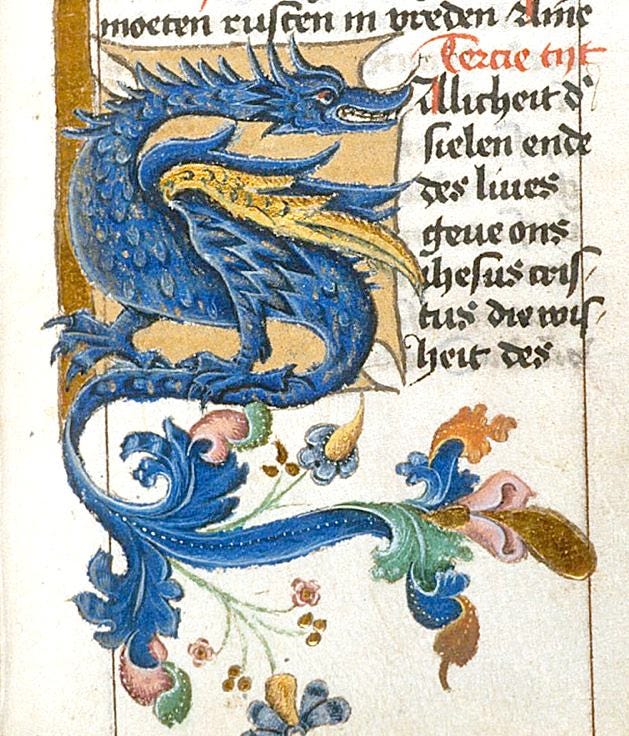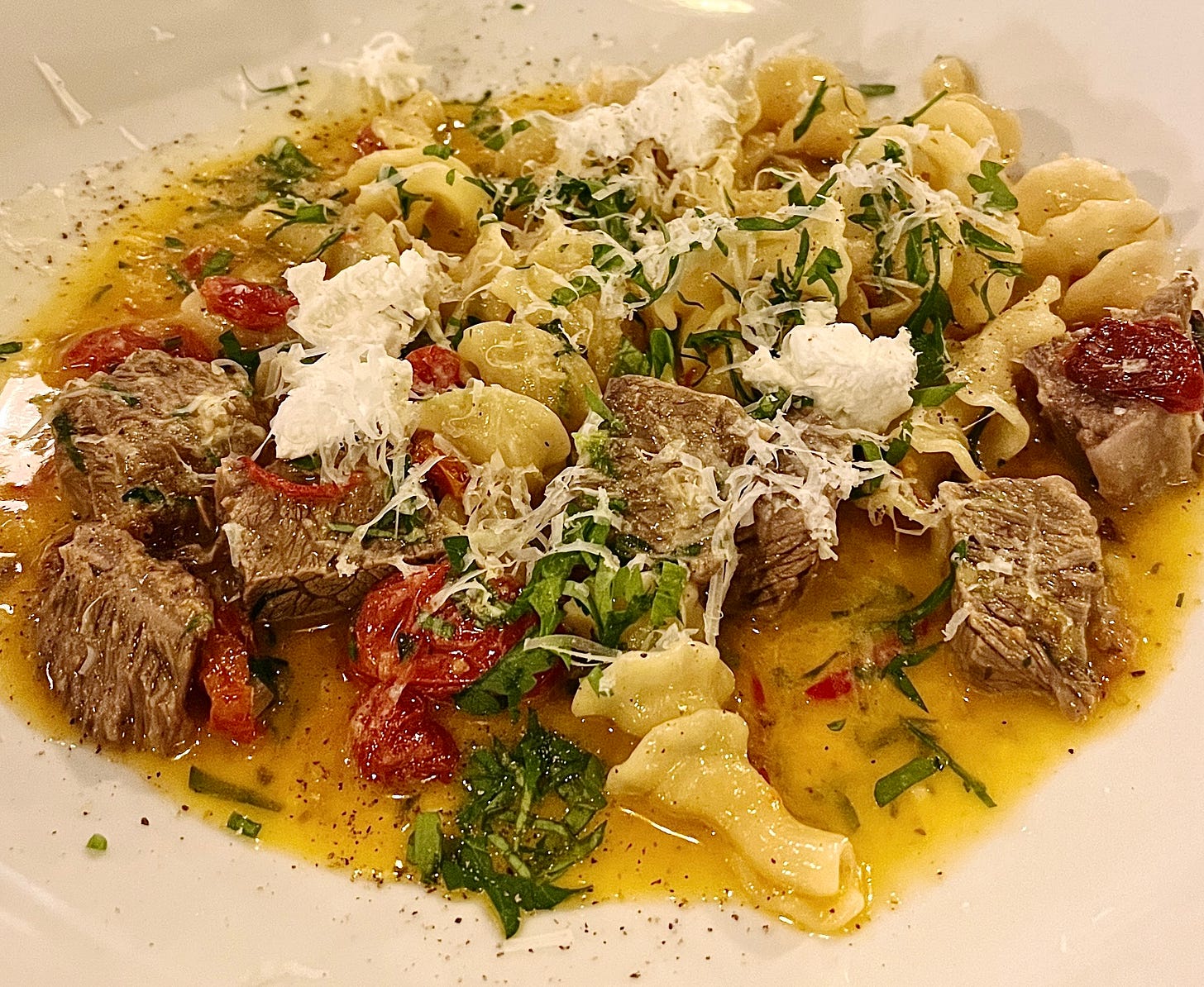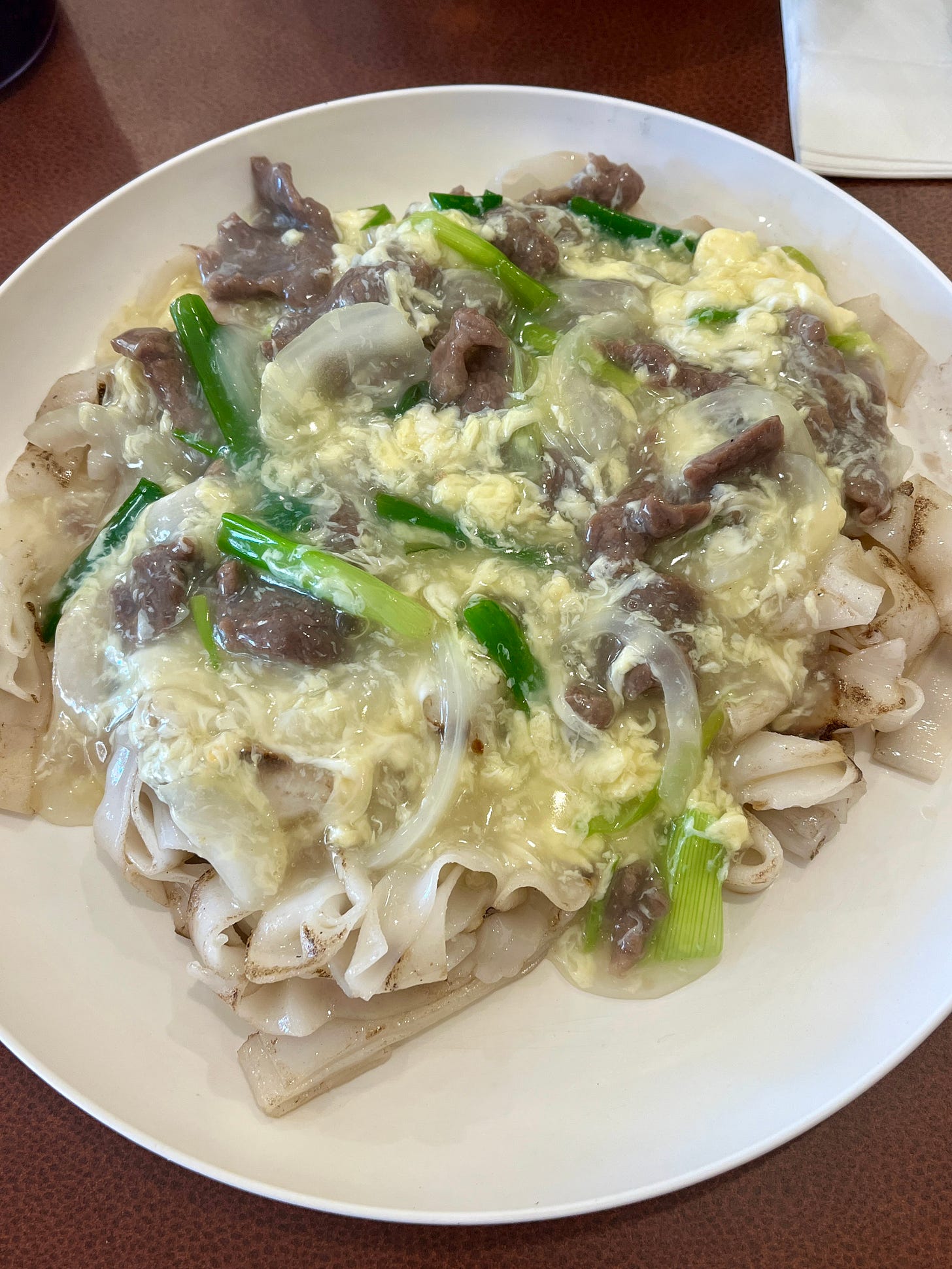Enter the Dragons
Some fragmented thoughts on Christmastide, the expansive hospitality of the festive season, intergenerational relationship, the food of Texas, and a song of morning
Saturday, December 30
Grand Rapids, Mich.
If you’ve been reading these letters for more than a millisecond, you know that one of my talents is my ability to bring an Eeyore-ish spirit to any party. Here we are on the sixth day of Christmas, and I’m still wondering what it means to celebrate.
The Roman Catholic writer Kevin DiCamillo observed a few years ago that the sixth day of Christmas is an oddity in the midst of this festive season: “I’ve always felt a sort of sorrow for this day. It is the only day in the Octave of Christmas that does not have some big-name (or for that matter any-name) saint to go with it.” The old song does tell us that we get six geese-a-laying today. That, bolstered by the lectionary, hints at the possibility that this day isn’t for remembering any particular saint: It’s for all of us. The daily lectionary points to Psalm 148, in which all creation is summoned to praise and which contains one of my favorite verses in all of Scripture: “Praise the Lord from the earth, ye dragons, and all deeps.”
Ye dragons!

It thrills my dorky heart that a creature depicted in The Lord of the Rings as destructive and terrifying and in Game of Thrones as armed royal chariots should, in the Bible, have its fiery breath turned to a beacon of hope, its roar joining a chorus of praise.
It seems right that Christians should consider these words amidst Christmastide, given the belief that Jesus’s arrival is wholly transformative for all the world. But the lectionary that brought the dragons into the Christmas conversation is a product of the second half of the 20th century. That fact reminds me how the traditions we have now are a mosaic of church history, pieced together over many centuries, various shards added, adjusted, moved, and even disappeared.
Christmastide was established, sort of, by the Second Council of Tours, a gathering of bishops in the 6th century. Those bishops didn’t seem particularly concerned with commemorating Christ’s birth. There were other, more pressing matters. Many of the 27 canons published by that council deal with the marital status of clergy; it was not uncommon then for priests to be married, and this council declared that a bishop “shall live with his Wife as with his Sister, without giving any cause of Suspicion.” Two address ministry to the impoverished, including one that calls for the excommunication of judges and leaders “who oppress the Poor.” Tucked within these rules is a set of fasting instructions for monks, including one delineating a festive season from Christmas Day through Epiphany. It feels like little more than a footnote.
Christmastide’s constituent have been cobbled together, in various configurations in various churches, over a much longer span of time. The Feast of St. Stephen, Christianity’s first recorded martyr, falls on the second day of Christmas. But it predates the Second Council of Tours; legend holds that, about a century prior, a priest named Lucian, who lived near Jerusalem, had rediscovered St. Stephen’s tomb on that day. The commemoration of King Herod’s legendary slaughter of infant boys used to happen on Epiphany; now most of the Western Church marks the Feast of Holy Innocents on the fourth day of Christmas, but the Syrian Orthodox and Maronites do it on the third. The carol Twelve Days of Christmas wasn’t published in the form we know until 1909.

I didn’t even know Christmastide was a thing until my twenties. I went to high school in Miami, and I knew that my Catholic classmates, many of them Cuban, marked Three Kings’ Day. But the churches in which I was reared mostly ignored that day as well as the other post-December 25th events, except what could be smooshed into one sanitized, rapid-fire reenactment. Only later did I learn that, for so much of the global church, Christmas is a season, not just a day.
It seems right that all the frenetic activity of the pre-Christmas season should bring more than one brief flare of delight. I appreciate that, during Christmastide, we get to take a breath. We survey the story’s full scope, regard the enduring darkness, and reflect on the flickering light that has come. We are invited to wrestle with the place of joy in a world marked by so much grief. And we sit with the sobering reality that, even in the biblical accounts of the events we remember some 2,000 years later, the tale of Jesus’s birth was an altogether more complicated and richly textured thing than we could conceivably pack into one Christmas pageant: the shepherds’ fear; a new mother’s exhausted pondering; the wise searching the skies for some sign of possibility; a fragile ruler inflicting his deathly power on innocents.
It seems right, too, that, underneath the modern English word “celebration,” there’s an altogether more complex heritage. The Latin verb celebrare can mean to celebrate, yes, but it can also mean to proclaim, to honor, to repeat a ritual, or to commemorate an important event. It can be tinged with happiness, sure, but it also makes room for so much more. It can be prime rib and fine wine but also microwaved leftovers and slightly stale Christmas cookies, the invigorating freshness of pine as well as the melancholy of fallen, brown needles. It’s the exuberant rip of wrapping paper but also the careful folding of that grandma who, remembering seasons of less, tries to save the remnants for one year more. It’s the roaring fire but also the still-warm embers. It’s the parts of the story in which we revel and the ones we’d rather overlook, too. It’s the joy of gathered loved ones as well as the sad recognition of the one who, for whatever reason, couldn’t be there.
So here’s to all who celebrate—and all the ways we might celebrate. Here’s to the loud festivities and the quiet moments snuggled under a quilt, to the laughter as well as to the tears. Here’s to the raucous delight and the silent sorrow, crowded parties and solo contemplation. Here’s to the geese and the dragons. Here’s to a Christmas hospitable enough for all these things, good and bad and somewhere in between, and to the Christ who will make everything new again.
What I’m Reading: Two very different essays I’d like to share this week.
The New York Times’s weekly Modern Love column is, more often than not, something I hate-read. Once in a while, though, there’s a gem that illuminates the beauty of human relationship and the power of belonging. Richard Morgan, a prolific and gifted journalist with an uncommon gift for careful observation, has written a heartwarming reflection on his relationship with his witty and wise 93-year-old grandmother that might just be the best Modern Love piece I’ve read. “If wisdom is knowledge plus time,” he writes, “she embodies wisdom’s next evolution: kindness.”
Then, from the Harvard Crimson, comes this essay on Israel and Palestine—or, more precisely, the discourse surrounding the events there—by Bernie Steinberg, who, for 17 years, headed Harvard Hillel, providing care to the campus Jewish community. His passion, eloquence, and thoughtfulness shine through. I was especially taken by his clarion call to consider not just what one argues but also how one argues. “If Israel’s cause is just, let it speak eloquently in its own defense,” he writes. “It is very telling that some of Israel’s own supporters instead go to extraordinary lengths to utterly silence the other side. Smearing one’s opponents is rarely a tactic employed by those confident that justice is on their side. If Israel’s case requires branding its critics antisemites, it is already conceding defeat.”
In short, Steinberg urges his readers to defend their opinions and proclaim their convictions with decency and respect toward those who differ. I wish we did so more often, in every area of disagreement. We can hold to our beliefs without wavering while also treating those who don’t hold them—even those who oppose them—without dehumanizing. We can advocate for our cause with ferocity without diminishing the ones who advocate for the counter-cause with equal ferocity. To dehumanize and diminish those who oppose us is to dehumanize and diminish ourselves.
What I’m Eating: Whenever I go to Texas, I’ll post a picture of something delicious I’ve eaten, and I’ll inevitably get a DM from some well-meaning person that says something along the lines of, “Looks great, but I hope you get out of there soon.” I’ve written about this puzzling dynamic before. There is no perfect place. Everywhere you go, you can find evidence of goodness and grace as well as something that annoys, troubles, or infuriates. Whatever its flaws—and we can make a long list, as we could about any place—I’ve come to love Texas, especially since I married into a family of proud Texans. And every single time I visit, I come home with gratitude for its rich diversity and particularly its food. This trip was no exception. Two highlights:
This campanelli with chunks of super-tender braised short rib, goat cheese, lemon, and Calabrese peppers from a favorite restaurant of ours in Austin, Foreign and Domestic. I never thought that goat cheese and beef would pair well, but here, they do, and the sauce, which is more brothy than, well, sauce-y, gives the dish a welcome and unexpected lightness.
Then, on my last day in Houston, just before going to the airport, Tristan and I went to Hong Kong’s Cafe, a Hong Kong-style diner in Chinatown with a totally unnecessary and mystifying possessive in its name. The 茶餐廳 (cha chaan teng)—literally, “tea eatery”)—is a unique genre of restaurant where the menu reflects Hong Kong’s hybridized culture: macaroni in chicken broth, with slices of ham; congee; baked pork chop with your choice of spaghetti or rice; wonton noodles. I picked a Cantonese classic—flat, wide rice noodles with beef and “smooth egg.” The instant the server put the plate down, a savory smokiness hit me—an incomparable scent called 鑊氣 (wok hei). The term is probably best translated “breath of the wok.” It is venerated in Cantonese cuisine, and it instantly transports me home. It’s also impossible to create in modern nonstick pans and difficult to summon in the home kitchen, as Kenji Lopez-Alt found when he turned his famously curious gaze to the phenomenon. As is my habit, I took my leftovers home with me on the plane, barely dodging disaster as the gravy began leaking out of the plastic container as well as the plastic bag, dripping all over my stuff. Still, enough survived that I got another whiff of the wok hei for breakfast the next morning.
I’ve written before about Dolly Parton’s “Light of a Clear Blue Morning,” one of my favorite songs from one of my favorite singer-songwriters. Parton got her big break on The Porter Wagoner Show. As Parton’s fame grew, though, Wagoner grew jealous and the relationship became fraught. In February 1974, she left the show. On her last day, she later recalled, it was raining, and as she drove home, the song began coming to her: “I been looking for the sunshine/ I ain’t seen it in so long/ Everything’s going to work out just fine/ Everything’s going to be all right.”
Three years later, Parton released “Light of a Clear Blue Morning,” which she called her “song of deliverance,” on her album New Harvest... First Gathering. The first couple of stanzas, all ache and tenderness, are where I tend to live. Then the song builds, Parton’s voice strengthening, moving from plaintive prayer to robust testimony. As much as I’ve long loved the song, I didn’t love the end, with its quicker tempo, its loud insistence that everything’s going to be all right, that jangling tambourine. When I last mentioned this song to you, one of you wrote to recommend the Wailin’ Jennys’ version, and for a while, I thought that I preferred that stripped-back, slowed-down, tambourine-free cover; they never quite finish the climb to exuberance.
The other morning—not clear, no blue in the sky—the house was quiet and Fozzie was napping. I was in my study, scrolling through the headlines and reflecting on this mess of a world, thinking about a hard conversation with a friend who’s been going through some stuff and reviewing our holidays in Texas (our first since my mother-in-law passed away). I put on the Wailin’ Jennys’ version, and then I listened to Dolly Parton’s, and I felt a shift. Why not some delight? Why not some tambourine?
As we make the turn from 2023 to 2024, here’s my wish for you—indeed, for all of us: May you not only see the light of a clear blue morning but also feel the shimmer of hope and the shine of soul-deep joy. May we regard the sorrows of our lives and the sadnesses of the world with compassion. May we be moved to bear witness not just to what is but also to what could be. May we truly believe that everything’s going to be all right, not because things just work out on their own, but because, together and with God’s gracious hand, we will find our way to liberation, healing, and celebration.
In hope and with gratitude,
Jeff







Waking up to the steady rain in Singapore during this Christmastide family visit, this was the article I needed to read to recalibrate and prepare myself for 2024 as I soak in the air, earth, smell and spirit of the country of my birth. I have a 90 year old dad with Alzheimer’s, a 53 year old wheelchair bound brother whose post stroke brain is fully intact but who needs help with all other daily functions and a step mother who has dementia. It is very easy to see the days as filled with duty bound activities but this trip I have been able to enjoy them as who they are now rather than wishing they are who they were. Laughing, talking, being silent and just being with them has been enough. The pre Christmas ambulance call and unexpected hospital stay for my dad did not diminish Christmas as joy and pain are all part of it. Thank you Jeff for the beautiful insights as ever and as another Chinese person living far from home (London), the culinary descriptions of some of my favourite food is always appreciated! Blessings and happy New Year!
Thank you. The thought of month long recognizing specifics of this Christmas time present and past. So appreciate The NY Times article. Made me rethink conversations I have with 90 year old mother. Enjoyed listening to the music too. Your writing helps me step outside my daily life. Happy new year.